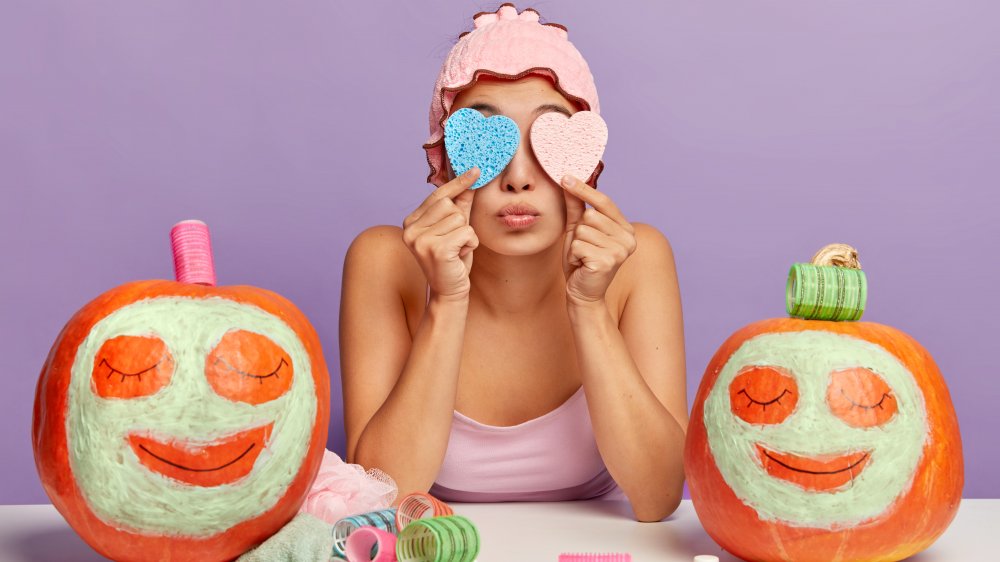This Is What Happens When You Eat Pumpkin Every Day
The fall season is the reason to make and consume all things pumpkin, or so goes the line of thought, as marketers use autumn to push forward all things pumpkin to consumers. And why not? The United States is among the top five countries that produce the most pumpkins (via Atlas Big). Not to mention, who in their right mind doesn't love pumpkin? At just 49 calories per one cup of the cooked squash, this fruit disguised as a vegetable has a miniscule amount of fat, is rich in beta-carotene, and is brimming over with oh-so-good-for-you vitamins and minerals. Simply put, pumpkin has a lot going on nutritionally. Not to mention, it is 94 percent water, which contributes to its low calorie nature (via Healthline).
But just because the market is inundated with pumpkin products, should you be eating it on a frequent or daily basis? What exactly does it do to your body when you consume this fall favorite every day? We searched the internet for everything you need to know about the health pros and cons of eating this squash. Before jumping on the pumpkin bandwagon, read on.
Eating pumpkin can promote beautiful skin, and turn it orange
Pumpkin is like a superfood for your skin. Per Healthline, one cup of cooked pumpkin has a whopping 245 percent of your recommended daily allowance of Vitamin A which, according to Environ Skin Care, is key to preventing acne and assists in healing. Additionally, because it's high in beta-carotene, pumpkin can serve as a natural sunblock, helping to protect your skin from those dreaded UV rays. And then there's all that vitamin C that your body uses to produce collagen which keeps your skin looking vibrant and young.
Before you start chowing down in the name of glowing skin, however, one doctor warns that too much pumpkin can also cause your skin to take on an orange or yellow hue. Dermatologist Whitney Bowe told #OWNSHOW,"If you actually consume too many vegetables or foods that have an orange-yellow color, your skin can start to turn a bit orange" (via Huffington Post). This happens with babies all the time and is largely associated with too many carrots (via Wholesome Baby). This change in skin tone is due to the very beta carotene that serves as a sunblock. Bowe notes that you will most likely see it on your hands and feet first. If you notice this, you should probably lay off the pumpkin, and consult your doctor if you have a medical concern.
Consuming pumpkin regularly might increase lifespan, fight off colds
According to the Express UK, eating pumpkin on a regular basis could increase your lifespan. It's certainly a nice notion to imagine that second slice of pumpkin pie or that plate full of pumpkin waffles calling your name in the morning is really adding years to your life. A dietician and a medical consultant told the publication that because members of the squash family are high in carotenoids, consuming them can help guard against heart disease and some cancers. They recommend eating squashes like pumpkin three times a week to realize its multitude of health benefits.
Pumpkin can also help boost your immune system. We already mentioned it is jam-packed with vitamin A, which is needed to help your body fight off infections and viruses, but one serving of pumpkin also contains one fifth of your recommended daily intake of vitamin C, which can help you stave off or get over the common cold a little quicker. In fact, while autumn has us craving pumpkin, eating pumpkin helps our bodies prepare to take on the sneezing and sniffling that also springs up in the fall (via WebMD).
Pumpkin can help with weight loss, keeping vision sharp
Healthline suggests that pumpkin might help with your weight loss. Because it is low in calorie and high in fiber, you can eat more of it to help your tummy feel full and keep your appetite in check. A source for WebMD concurs. Caroline Kaufman, MS, RDN, told the site that a cup of canned pumpkin has seven grams of fiber. "That's more than what you'd get in two slices of whole-grain bread."
Pumpkin can also help keep your eyesight healthy, particularly as your birthdays start adding up. According to a posting at the National Library of Medicine that analyzed 22 studies, it was concluded that people who had a diet rich in beta-carotene were less likely to be diagnosed with cataracts. Additionally, pumpkin seeds contain a quarter of the recommended daily intake for zinc, which may help you maintain your vision acuity (via Southwestern Eye Center).
Before you start adding pumpkin to your daily diet, however, Healthline cautions that some people have allergic reactions to pumpkin. The food can be a diuretic as well, helping your body get rid of water and salt. This can cause problems if you are taking certain medications, so be sure to consult a physician before you make significant changes to your diet.



